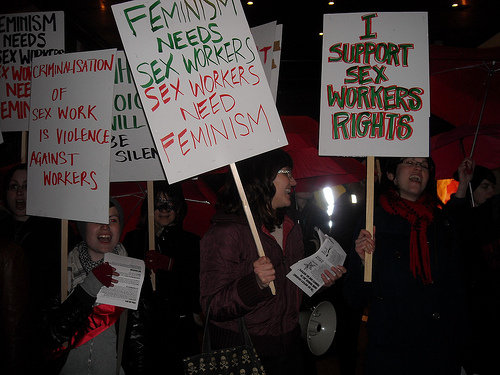So in a forum like this, its probably stating the obvious to remind ourselves that many feminists are sex workers and sex workers are often feminists. Nevertheless, I think we would also all agree that, outside of this room, feminists and sex workers are generally seen as oppositional groups, even by feminists and sex workers themselves.
I’m speaking here today as an activist with Feminist Fightback which has sought to build links between the feminist and sex worker movements. I want to argue that feminists need sex workers just as the sex worker movement needs feminism. In other words, I want to think about how taking a feminist perspective on sex work can help to develop and strengthen the politics of both movements.
Feminist Fightback is a network of socialist and anti-capitalist feminists, which emerged out of two large conferences we held in 2006 and 2007. Since then we’ve been meeting regularly in London and have recently started another group in Manchester. We’ve been involved in a wide range of activity, on issues ranging from reproductive freedom, to supporting the tube cleaners strike here last summer, to opposing detention centres for asylum seekers, to going into schools to talk about feminism. But most often we’re characterised within the feminist movement as ‘the people who support prostitution’.
This is because we support th e decriminalisation of the sex industry and sex workers’ right to unionise. And we’ve done a lot of work in alliance with sex worker organisations. Some Fightback members, for example, have been involved in x:talk, a sex worker led project that provides free English classes for migrants in the sex industry. Feminist Fightback also organised a red umbrella contingent on various feminist marches, including the Reclaim the Night March, to demand safe streets for sex workers. We’ve put together a workshop exploring the myths, morals and immigration policies that lie behind the ‘trafficking’ discourse; and just yesterday we supported the sex worker speak out, where some of us blocked the road to unfurl a banner proclaiming ‘sex workers are stopping the traffick’, in protest against the Policing and Crime Bill currently in parliament in the UK.
e decriminalisation of the sex industry and sex workers’ right to unionise. And we’ve done a lot of work in alliance with sex worker organisations. Some Fightback members, for example, have been involved in x:talk, a sex worker led project that provides free English classes for migrants in the sex industry. Feminist Fightback also organised a red umbrella contingent on various feminist marches, including the Reclaim the Night March, to demand safe streets for sex workers. We’ve put together a workshop exploring the myths, morals and immigration policies that lie behind the ‘trafficking’ discourse; and just yesterday we supported the sex worker speak out, where some of us blocked the road to unfurl a banner proclaiming ‘sex workers are stopping the traffick’, in protest against the Policing and Crime Bill currently in parliament in the UK.
Such activity has meant that some other feminist groups have refused to work with us. Most unfortunately we had the venue for the Gender/Race/Class conference that we held in February cancelled at the last minute because an anti-domestic violence organisation who had originally booked the venue for us decided that they could not support an event that “glamourised prostitution” (in fact there was only one workshop in the entire conference which touched on the issue of sex work).
have refused to work with us. Most unfortunately we had the venue for the Gender/Race/Class conference that we held in February cancelled at the last minute because an anti-domestic violence organisation who had originally booked the venue for us decided that they could not support an event that “glamourised prostitution” (in fact there was only one workshop in the entire conference which touched on the issue of sex work).
This experience revealed to us the extent to which sex work has become THE dividing issue within the feminist movement at the moment. Regardless of all the other issues that we might agree on, many feminists who support the abolition of the sex industry feel that if you take a different position on this question then it’s not possible to work together at all. While this is extremely frustrating and counter-productive, it also tells us something about the wider political fault lines that run through feminism in the UK at the moment.
Abolitionist feminists, those who support the criminalisation of the sex industry, who tend to depict all sex workers as victims, and who refuse to listen to sex worker organisations – these feminists seem to me to be promoting a very distinctive form of feminism which places its faith primarily in the state. Those who campaign for the closure of lap dancing clubs, who support the Swedish model, and who champion Home Secretary Jacqui’s Smith’s Policing and Crime Bill, seem to think that the only way to improve the lives of women is to look to the state to impose change from above. They do not trust women to transform their own lives through collective action, and they do not seem to think that the people who might know what’s best for sex workers might be sex workers themselves.
By contrast, Feminist Fightback’s support for sex workers’ organising, seems to us be the only logical outcome of the kind of feminist movement we want to build. In response to the genuine concern of many feminists about the conditions in the sex industry, we argue that the best way to fight such exploitation is to support workers within it organising to transform their work and their lives. We also feel that this approach is the only one consistent with our wider political commitments to workers’ self-organisation, to bringing about change from below and to a rejection of moralistic, didactic and authoritarian attitudes to sex. For us, then, this was the only possible ‘feminist’ approach to the question of sex work.
So that’s a few of the reasons why feminists need to support sex workers, but why do I think that the sex worker movement needs feminism? Well, while we recognise that sex workers are of all genders – women, men and trans – we also have to acknowledge that the vast majority of sex workers are women. And also that we cannot understand why the sex industry works in the way that it does unless we look at the gendered power dynamics that operate within it.
 I don’t mean this in some abstract way – that we need to have a really excellent analysis of sex work or something. I mean it in the sense that we need feminism in order to fight to win. For example, one of the reasons why sex workers historically have been stigmatised has a lot to do with the desire to regulate women’s sexual activity – prostitutes were women who didn’t behave properly – and the will to control women’s bodies continues to inform much of the repressive anti-sex worker legislation that exists all over the world. We also need to stop people like Jacqui Smith appropriating ‘feminism’ for her disgusting anti-women, anti-immigrant policies, to be able to answer her when she says that anyone who wants to stop violence against women has to call for the abolition of the sex industry.
I don’t mean this in some abstract way – that we need to have a really excellent analysis of sex work or something. I mean it in the sense that we need feminism in order to fight to win. For example, one of the reasons why sex workers historically have been stigmatised has a lot to do with the desire to regulate women’s sexual activity – prostitutes were women who didn’t behave properly – and the will to control women’s bodies continues to inform much of the repressive anti-sex worker legislation that exists all over the world. We also need to stop people like Jacqui Smith appropriating ‘feminism’ for her disgusting anti-women, anti-immigrant policies, to be able to answer her when she says that anyone who wants to stop violence against women has to call for the abolition of the sex industry.
And in Feminist Fightback, we not just feminists but anti-capitalist feminists. And one of the most slippery arguments being made by some abolitionists at the moment is about the capitalist nature of the global sex industry – about the vast profits being made by the likes of Peter Stringfellow from the labour of others. This also calls into question the concept of choice. Of course its crucial to challenge the idea that all sex workers are forced into prostitution against their will, and to point out that many people choose to work in the sex industry for a variety of reasons. Nevertheless, I don’t think that the liberal concept of choice is adequate to explaining or opposing the conditions that exist within the sex industry. It’s not enough to say that we should all be free to do what we like with our bodies and that that’s the end of it. No one is free, in our society, while we continue to have to work to stay alive, and while we have to negotiate powerful forces that restrict and control how we express our sexuality. While demanding the right to work has to be the starting point for the sex worker movement, we’ve got to be able to go beyond this and to look at all the other forms of exploitation that continue to take place (migration etc.)
So perhaps this is something we can all discuss in a minute, but I want to end by calling for not only for a feminist sex worker movement, but also for a sex worker movement that challenges the bosses as well as the abolitionists. We need to be able to talk about how sex workers organising together can find ways to stop exploitation not only in the sex industry, or the work place, but to end it full stop.
For more information about X:Talk, the International Union of Sex Workers and the English Collective of Prostitutes.
FF Report of the Reclaim the Night March 2008
[flickr_set id=”72157649017162424″]

